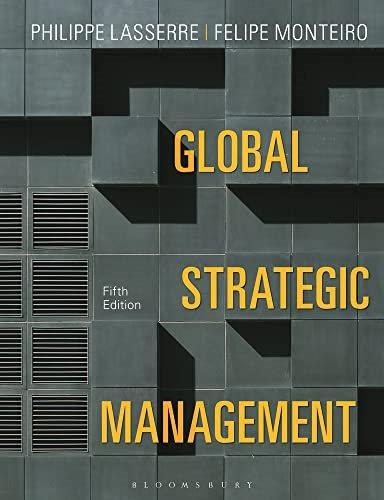On 16 April 2015 Nokia announced that it would buy Alcatel-Lucent for $16.6 billion. This announcement marked
Question:
On 16 April 2015 Nokia announced that it would buy Alcatel-Lucent for $16.6 billion. This announcement marked the latest in a swirl of global mergers and acquisitions in the fast-evolving telecoms equipment industry.
The telecommunications equipment industry produces products and services that are used to support telecommunication services: wireless and landline infrastructure equipment (such as cables, routers, exchanges), as well as handsets and mobile phones. Since the invention of the telephone by Alexander Graham Bell the telecommunication industry has been divided into two segments: the equipment and the services. Originally, in many countries, the services operators were national government-owned companies. In the USA, the American Telegraph and Telephone Company was involved in both segments. In other parts of the world, national operators bought equipment from national or nationally based producers. Hence the development of strong national equipment producers:
Ericsson in Sweden, Alcatel in France, Nortel in Canada, NEC in Japan and Nokia in Finland. The 1960s saw a series of developments that transformed the industry, and still affect it today.
First, technological development such as digitalization, the opening of trade barriers and deregulation created the full or partial denationalization of operators, while economies of scale pushed firms toward concentration of competition.
Second, the internet revolution introduced new technologies and products such as routers, giving rise to crucial new markets that were captured by new players such as Cisco in the USA or Huawei in China.
Third, mobile technology saw the creation of a new type of internet-based technology: the smartphone, as initiated by Apple and Samsung, modified the competitive landscape.
This is the rapidly evolving background against which the acquisition of Alcatel-Lucent by Nokia took place.
Alcatel, created in 1879, was originally a giant French conglomerate involved in power generation, transportation equipment, and shipbuilding and telecommunications equipment. In 1992, the non-telecoms businesses were divested and Alcatel concentrated on telecommunications.
In the USA, Lucent was spun off from American Telegraph and Telephone (ATT), which itself had been created in 1876 under the name of the Bell Company. Both Alcatel and Lucent were affected by the bursting of the internet bubble in 2001, seeing revenues and profit decline as telephone operators cut costs. In 2006 Alcatel and Lucent merged. The two companies had very different cultures and neither Alcatel nor Lucent had strong products in wireless technologies. Changes in management and reorganizations were not sufficient to keep a strong position in the telecoms equipment industry dominated by Cisco, Huawei, Apple and Samsung.
Nokia, founded in 1865 as a pulp and paper company, developed as an industrial conglomerate involved in rubber and cables. The mobile phone business, created in 1979, achieved global predominance in the 1990s with its digital cellular handsets, overtaking Motorola as the world number one producer of mobile phones. In 2007 its global market share was 30 per cent. However, Nokia did not manage to break into the smartphone industry dominated by Apple’s iPhones and Samsung’s Android. By 2011, Nokia’s market share in mobile phones had declined from 30 per cent to 14 per cent.
Despite cost cutting, Nokia was unable to make its mobile phone business profitable again. The company decided to sell this division to Microsoft and concentrate on the supporting equipment business.
Hence the decision to acquire Alcatel-Lucent.
However the integration of the two companies proved to be difficult, hence the decision to cut 1,233 jobs in French in 2020, creating an uproar in French political circles.
Questions:
1 What pushed those giant companies to join forces?
2 Did Nokia made a good decision in acquiring Alcatel-Lucent?
Step by Step Answer:

Global Strategic Management
ISBN: 9781350932968
5th Edition
Authors: Philippe Lasserre, Felipe Monteiro





